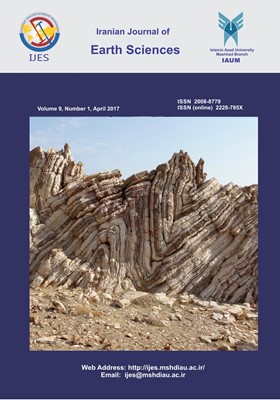Petrogenesis of mantle peridotites from the South of Jazmourian, Makran accretionary prism, Iran
Subject Areas : MineralogyMohammad Elyas Moslempour 1 * , Morteza Khalatbari-Jafari 2 , Tomoaki Morishita 3 , Habib Biabangard 4
1 - Research Center for Earth Science, Zahedan Branch, Islamic Azad University, Zahedan, Iran
2 - Research Institute for Earth Science, Geological Survey of Iran, Tehran, Iran
3 - School of Natural System, College of Science and Engineering, Kanazawa University, Japan
4 - Department of Geology, Faculty of Science, University of Sistan and Baluchestan, Zahedan, Iran
Keywords: Supra-subduction zone (SSZ), Jazmourian, Peridotite, Iran, Makran,
Abstract :
Mantle peridotites exposed in south Jazmourian comprise of lherzolite and porphyroclastic Cpx-bearing harzburgite in the lower part with chromitite lenses in the upper parts. Petrography and microprobe studies shows evidence of melt-peridotite interactions; post melting processes and subsolidus interactions, which has been associated with appearance of two generations of deformed primary pyroxene-olivine and fine-grained pyroxene-olivine-amphibole neoblasts. Second generation of minerals formed as inclusion, interstitial and fine-grain. These two groups of minerals have different geochemical characteristics, So that, the first group are comparable with abyssal peridotites and second group are comparable to suprasubduction (SSZ) peridotites. Thus, the chemical compositions of different generations minerals show different petrogenesis for ultramafic rocks in south Jazmourian. Whole rock chemical data indicate south Jazmourian peridotites have a depleted MORB mantle source which undergoing 10-20% partial melting. Thus this peridotites have experienced multistage evolution and show characteristics of the abyssal environment to suprasubduction zone. We are belived that peridotites transition from the abyssal environment to suprasubduction and affected by fluids derived from the subducted slab.

